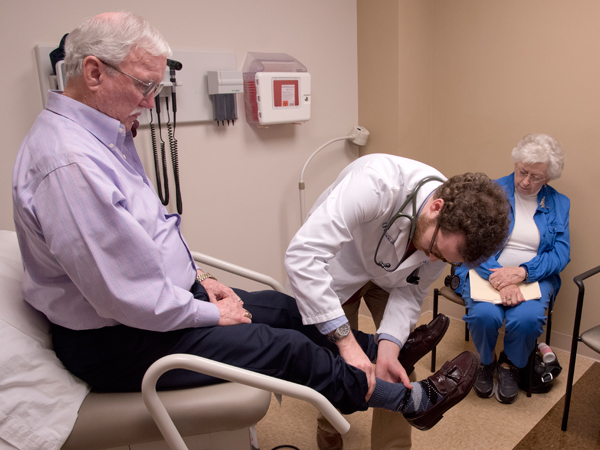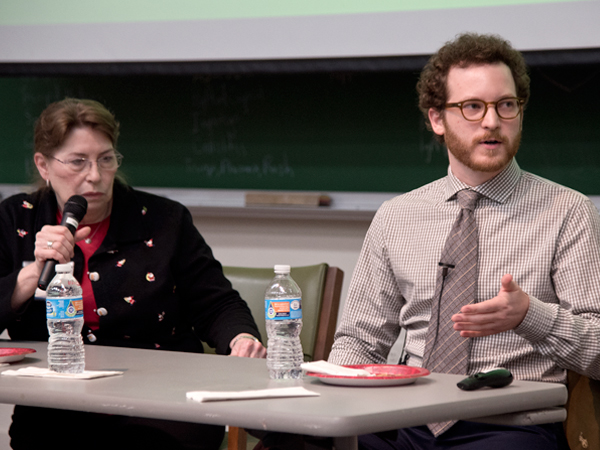Elderly often haunted by ghosts of holidays past and present

Tiny Tim—the ailing child in “A Christmas Carol”—is the image that may materialize when we picture the less fortunate at Christmas, said Dr. Scott Gibson, assistant professor of medicine (geriatrics).
“But what about Ebenezer Scrooge?” Gibson said during Thursday's presentation, “Holidays and the Elderly.”
Gibson, along with Sue Ann Meng, geriatrics social worker, led dozens of UMMC health care professionals in the discussion, the latest in the series of Schwartz Center Rounds sessions designed to promote compassionate care and strengthen caregiver-patient relations.
The two identified ways to help relatives and patients cope with a time of year that proves difficult for many as they grow older and, at times, more Scrooge-like.
“Underneath the gruff exterior is someone with feelings,” Gibson said.
Like the fictional Scrooge, many of the elderly spend the holidays estranged from family members while reliving old Christmas memories. For those reasons and more, they are susceptible to depression, anxiety and chronic insomnia, especially those who live alone or in personal-care homes.
“They have long histories and memories—good and bad,” Gibson said. “The loss of loved ones changes how they view the holidays.”
To lighten this burden of “holiday blues,” Gibson suggested that health care professionals and other caregivers:
- Share the load with other family members or staff
- Present elderly patients with Christmas cards or small gifts
- Involve these older adults in activities that include small children
- Resist the urge to offer your advice
- Include aging parents or other relatives in decision-making
One of Gibson's patients, Robert Cawthorn of Brandon, is the opposite of the unredeemed Scrooge. He and his wife Judy love the holidays, a time when they are able to be with their three grown daughters and 13 grandchildren.
“But it's hard on some of my long-time friends,” said Cawthorn, 77. “Also, I lost my parents when I was 8. And my wife has lost hers. Something will happen that reminds us of what we used to do with our parents during the holidays.
“Certainly, you wish your folks were still with you. It's a little sad. Holidays bring back memories, but they are also sweet memories.”

For her part, Meng has also lost her parents. “During the holidays, it changes our entire family dynamics,” she said, “because they had always been there. They had the big house, the meeting point.” The holiday traditions were established in that home—which the family eventually had to sell—making at least one of Meng's siblings feel not only like an “orphan,” but also “homeless.”
Elderly parents, including those in nursing homes or hospitals, or those who are otherwise separated from their families, may have similar feelings of isolation. Those emotions are compounded when they have lost a wife or husband.
In that case, Meng advised “giving the surviving spouse control over expectations for the holidays.” Let him or her decide, for instance, if the gathering will serve as a tribute to the wife or husband. “Or plan a new tradition for the holiday,” she said.
For the elderly, perhaps the most alarming specter of all during the holidays is the onset of dementia or Alzheimer's disease.
“Strangers in the house they don't recognize, loud noises, large crowds—all of these things can upset them,” Gibson said.
Holiday gatherings can become even more stressful when parents suffer dementia that progresses quickly, Meng said. “You have family members who may not have seen the parents in six months or a year and they expect things to be the same. When they're not, they blame the caregiver.”
For caregivers and relatives, there are ways to help the elderly, and themselves, cope with the challenges of dementia this season, Gibson and Meng said:
- Temper expectations for yourself and other family members. Let out-of-town relatives know what to expect if they haven't seen the affected family member in a while.
- Let the elderly parent or relative make decisions, but offer easy, simple choices.
- Plan activities that take into account how mobile your relative is.
- When following family traditions, set priorities and focus on those most important to the family.
- Take advantage of the MIND (Memory Impairment and Neurodegenerative Dementia) Center clinics, where diagnosis and follow-up treatments are available.
- Participate in caregiver support groups.
- Recognize that things will change, and give yourself permission to change.
Cawthorn, for one, said his advancing age has not diminished the joy he finds in Christmas. “You have to learn to realize what you have right now,” he said. “Just be thankful for that. Enjoy those you have while you can.”


